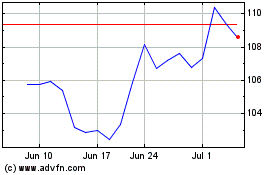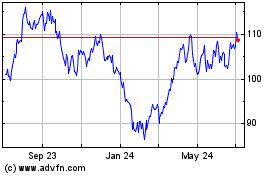Big Raises In Argentina Foreshadow Complicated Wage Talks
January 26 2012 - 3:46PM
Dow Jones News
Workers in the Argentine oilseed-crushing industry won a 24% pay
raise this week in the first salary deal of 2012, setting a high
bar for upcoming wage talks in other sectors.
Most Argentine unions negotiate annual salary increases with
employers between March and May each year, but unions in the
banking and crushing industries were early movers. Bank employees
secured a preliminary increase of 23.7% last month, which the union
said will serve as a base for further wage talks in March.
"Organized labor remains powerful in Argentina, and local
observers expect average increases to settle around 22% to 23%,"
Standard Chartered Bank said in a report.
That would be considerably higher than the 18% increase the
administration of President Cristina Kirchner reportedly wants
unions to accept in 2012.
But Kirchner will have a hard time convincing unions that have
enjoyed government-backed pay raises of close to 30% in recent
years to cede ground.
Analysts say those outsized wage increases are the product of
inflation that most private-sector forecasters estimate at between
20% and 25%. The heavily criticized national statistics agency,
Indec, said inflation as measured by its consumer price index eased
to 9.5% at the end of 2011.
Argentina's inflation conundrum is largely the product of lax
fiscal and monetary policy coupled with a booming economy that
expanded 9.2% for a second consecutive year in 2011.
Rather than cutting spending and tightening monetary policy,
Kirchner's government has resorted to price controls to try to keep
inflation from getting out of hand.
Doubts about Kirchner's high-growth, high-inflation economic
policies led residents and investors to pull more than $18 billion
out of the country during the first nine months of last year
alone.
Inflation is also slowly eroding the competitiveness of
exporters who face soaring material and wage costs.
The base salary for oilseed crushing workers has nearly tripled
since 2009, with this week's increase bringing it to 6,200 pesos
($1,442) a month.
The union based its salary demands on a cost-of-living study
produced by the Rosario National University, said Carlos Zamboni,
an attorney for the union.
The government's desire to limit wage increases this year has
put Kirchner squarely at odds with her former ally Hugo Moyano, who
leads the powerful Confederacion General del Trabajo trade union
confederation.
Moyano has balked at what he sees as an attempt by the
government and employers to make workers bear the economic costs of
cooling inflation.
The former truck driver has frequently said unions will base
their 2012 salary demands on "supermarket prices" and not official
inflation data.
That could make for tense salary talks in coming months as
unions loyal to Moyano resist calls by the government and big
business to moderate their wage demands.
Negotiations between the oilseed-crusher union and grain
exporters like the Bunge Ltd. (BG) and Cargill Inc. were tense,
with the Labor Ministry ordering both sides to the negotiating
table after the union went on strike in December.
-By Shane Romig, Dow Jones Newswires; 54-11-4103-6738;
shane.romig@dowjones.com
Bunge Global (NYSE:BG)
Historical Stock Chart
From May 2024 to Jun 2024

Bunge Global (NYSE:BG)
Historical Stock Chart
From Jun 2023 to Jun 2024
